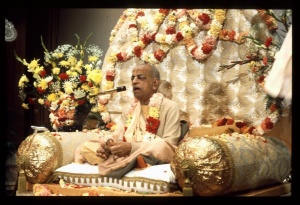CC Madhya 5.23: Difference between revisions
m (1 revision(s)) |
(Vanibot #0054 edit - transform synonyms into clickable links, which search similar occurrences) |
||
| (One intermediate revision by one other user not shown) | |||
| Line 1: | Line 1: | ||
{{ | [[Category:Sri Caitanya-caritamrta - Madhya-lila Chapter 05|C023]] | ||
<div style="float:left">'''[[Sri Caitanya-caritamrta|Śrī Caitanya-caritāmṛta]] - [[CC Madhya|Madhya-līlā]] - [[CC Madhya 5|Chapter 5: The Activities of Sākṣi-gopāla]]'''</div> | |||
<div style="float:right">[[File:Go-previous.png|link=CC Madhya 5.22|Madhya-līlā 5.22]] '''[[CC Madhya 5.22|Madhya-līlā 5.22]] - [[CC Madhya 5.24|Madhya-līlā 5.24]]''' [[File:Go-next.png|link=CC Madhya 5.24|Madhya-līlā 5.24]]</div> | |||
{{CompareVersions|CC|Madhya 5.23|CC 1975|CC 1996}} | |||
{{RandomImage}} | |||
==== TEXT 23 ==== | ==== TEXT 23 ==== | ||
<div | <div class="verse"> | ||
kanyā-dāna-pātra āmi nā ha-i tomāra | :kanyā-dāna-pātra āmi nā ha-i tomāra | ||
kṛṣṇa-prītye kari tomāra sevā-vyavahāra | :kṛṣṇa-prītye kari tomāra sevā-vyavahāra | ||
</div> | </div> | ||
| Line 12: | Line 16: | ||
==== SYNONYMS ==== | ==== SYNONYMS ==== | ||
<div | <div class="synonyms"> | ||
kanyā-dāna- | ''[//vanipedia.org/wiki/Special:VaniSearch?s=kanyā&tab=syno_o&ds=1 kanyā]-[//vanipedia.org/wiki/Special:VaniSearch?s=dāna&tab=syno_o&ds=1 dāna]-[//vanipedia.org/wiki/Special:VaniSearch?s=pātra&tab=syno_o&ds=1 pātra]'' — a bridegroom suitable for one’s daughter; ''[//vanipedia.org/wiki/Special:VaniSearch?s=āmi&tab=syno_o&ds=1 āmi]'' — I; ''[//vanipedia.org/wiki/Special:VaniSearch?s=nā&tab=syno_o&ds=1 nā]'' — not; ''[//vanipedia.org/wiki/Special:VaniSearch?s=ha&tab=syno_o&ds=1 ha]-i'' — am; ''[//vanipedia.org/wiki/Special:VaniSearch?s=tomāra&tab=syno_o&ds=1 tomāra]'' — of you; ''[//vanipedia.org/wiki/Special:VaniSearch?s=kṛṣṇa&tab=syno_o&ds=1 kṛṣṇa]-[//vanipedia.org/wiki/Special:VaniSearch?s=prītye&tab=syno_o&ds=1 prītye]'' — only for satisfaction of Kṛṣṇa; ''[//vanipedia.org/wiki/Special:VaniSearch?s=kari&tab=syno_o&ds=1 kari]'' — I do; ''[//vanipedia.org/wiki/Special:VaniSearch?s=tomāra&tab=syno_o&ds=1 tomāra]'' — of you; ''[//vanipedia.org/wiki/Special:VaniSearch?s=sevā&tab=syno_o&ds=1 sevā]'' — of service; ''[//vanipedia.org/wiki/Special:VaniSearch?s=vyavahāra&tab=syno_o&ds=1 vyavahāra]'' — activities. | ||
</div> | </div> | ||
| Line 19: | Line 23: | ||
==== TRANSLATION ==== | ==== TRANSLATION ==== | ||
<div | <div class="translation"> | ||
“Sir, I am not a suitable bridegroom for your daughter. I render service to you only for the satisfaction of Kṛṣṇa. | “Sir, I am not a suitable bridegroom for your daughter. I render service to you only for the satisfaction of Kṛṣṇa. | ||
</div> | </div> | ||
| Line 26: | Line 30: | ||
==== PURPORT ==== | ==== PURPORT ==== | ||
<div | <div class="purport"> | ||
Both brāhmaṇas were pure Vaiṣṇavas. The younger man took special care of the older one simply to please Kṛṣṇa. In Śrīmad-Bhāgavatam ([[SB 11.19.21]]) Kṛṣṇa says, mad-bhakta-pūjābhyadhikā: “It is better to render service to My devotee.” Thus, according to the Gauḍīya-Vaiṣṇava philosophy of Caitanya Mahāprabhu, it is better to be a servant of the servant of God ([[CC Madhya 13.80]]). One should not try to serve Kṛṣṇa directly. A pure Vaiṣṇava serves a servant of Kṛṣṇa and identifies himself as a servant of a servant of Kṛṣṇa. This is pleasing to Lord Kṛṣṇa. Śrīla Narottama dāsa Ṭhākura confirms this philosophy: chāḍiyā vaiṣṇava-sevā nistāra peyeche kebā. Unless one serves a liberated Vaiṣṇava, he cannot attain liberation by directly serving Kṛṣṇa. He must serve the servant of Kṛṣṇa. | Both ''brāhmaṇas'' were pure Vaiṣṇavas. The younger man took special care of the older one simply to please Kṛṣṇa. In [[Srimad-Bhagavatam|''Śrīmad-Bhāgavatam'']] ([[SB 11.19.20-24|SB 11.19.21]]) Kṛṣṇa says, ''mad-bhakta-pūjābhyadhikā'': “It is better to render service to My devotee.” Thus, according to the Gauḍīya-Vaiṣṇava philosophy of Caitanya Mahāprabhu, it is better to be a servant of the servant of God ([[CC Madhya 13.80]]). One should not try to serve Kṛṣṇa directly. A pure Vaiṣṇava serves a servant of Kṛṣṇa and identifies himself as a servant of a servant of Kṛṣṇa. This is pleasing to Lord Kṛṣṇa. Śrīla Narottama dāsa Ṭhākura confirms this philosophy: ''chāḍiyā vaiṣṇava-sevā nistāra peyeche kebā''. Unless one serves a liberated Vaiṣṇava, he cannot attain liberation by directly serving Kṛṣṇa. He must serve the servant of Kṛṣṇa. | ||
</div> | </div> | ||
__NOTOC__ | |||
<div style="float:right; clear:both;">[[File:Go-previous.png|link=CC Madhya 5.22|Madhya-līlā 5.22]] '''[[CC Madhya 5.22|Madhya-līlā 5.22]] - [[CC Madhya 5.24|Madhya-līlā 5.24]]''' [[File:Go-next.png|link=CC Madhya 5.24|Madhya-līlā 5.24]]</div> | |||
__NOTOC__ | |||
__NOEDITSECTION__ | |||
Latest revision as of 23:35, 19 February 2024

A.C. Bhaktivedanta Swami Prabhupada
TEXT 23
- kanyā-dāna-pātra āmi nā ha-i tomāra
- kṛṣṇa-prītye kari tomāra sevā-vyavahāra
SYNONYMS
kanyā-dāna-pātra — a bridegroom suitable for one’s daughter; āmi — I; nā — not; ha-i — am; tomāra — of you; kṛṣṇa-prītye — only for satisfaction of Kṛṣṇa; kari — I do; tomāra — of you; sevā — of service; vyavahāra — activities.
TRANSLATION
“Sir, I am not a suitable bridegroom for your daughter. I render service to you only for the satisfaction of Kṛṣṇa.
PURPORT
Both brāhmaṇas were pure Vaiṣṇavas. The younger man took special care of the older one simply to please Kṛṣṇa. In Śrīmad-Bhāgavatam (SB 11.19.21) Kṛṣṇa says, mad-bhakta-pūjābhyadhikā: “It is better to render service to My devotee.” Thus, according to the Gauḍīya-Vaiṣṇava philosophy of Caitanya Mahāprabhu, it is better to be a servant of the servant of God (CC Madhya 13.80). One should not try to serve Kṛṣṇa directly. A pure Vaiṣṇava serves a servant of Kṛṣṇa and identifies himself as a servant of a servant of Kṛṣṇa. This is pleasing to Lord Kṛṣṇa. Śrīla Narottama dāsa Ṭhākura confirms this philosophy: chāḍiyā vaiṣṇava-sevā nistāra peyeche kebā. Unless one serves a liberated Vaiṣṇava, he cannot attain liberation by directly serving Kṛṣṇa. He must serve the servant of Kṛṣṇa.